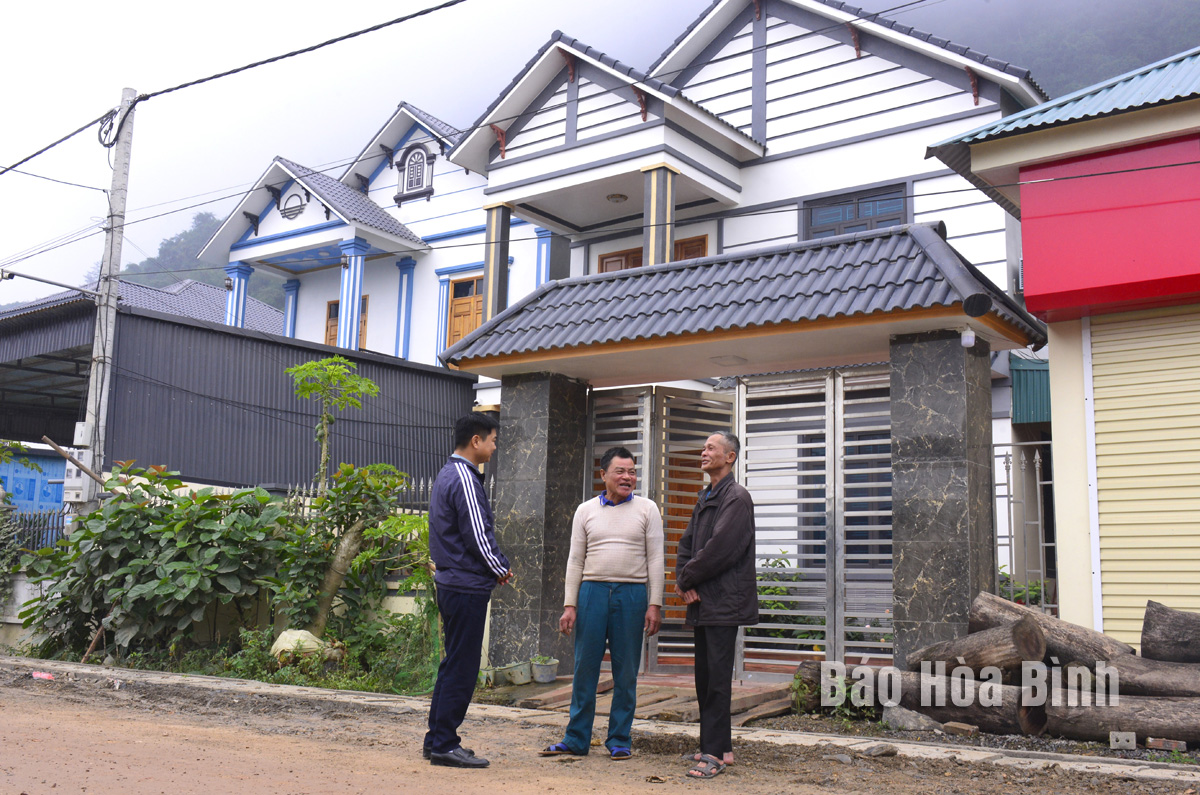
The new Nhun hamlet in Yen Phu commune, Lac Son district is one of the eight resettlement areas in the Canh Tang reservoir project, while the old Nhun hamlet is now submerged. The hamlet, about three kilometres away from the commune’s centre, is now home to more than 100 households.
Part of the Nhun resettlement area in Yen Phu commune, Lac Son district.
Almost all houses in the resettlement area are permanent houses built at a cost of at least 1 billion VND (41,000 USD) each. In 2029, the district and commune authorities called on people in the former Nhun hamlet to relocate to make room for the construction of the Canh Tang reservoir.
About 100 households were arranged in the resettlement area with sufficient infrastructure including concrete roads, lighting systems, and community houses. Each household was allocated 400 sq.m of land to build a house.
Bui Van Binh, the land management official of Yen Phu commune said that the commune has two resettlement areas for people relocated for the reservoir, which are Da Moi and Nhun hamlets. He said that at the beginning of the relocation, people did not want to go far from their fields and ancestors' graves. However, the entire political system including cadres, Party members, and prestigious persons joined hands to persuade people to follow the Government’s policy. Meanwhile, relevant units and investors implemented solutions to remove difficulties in compensation.
The Canh Tang reservoir project is one of the four key projects of the Ministry of Agriculture and Rural Development and a key project of the province. It is considered a major irrigation project in the North, with a capacity of about 91 million cubic metres. A total of 652 households had to move for the reservoir’s construction.
The Lac Son district People's Committee built eight resettlement areas for people in eight hamlets of three communes - Van Nghia, Binh Hem, and Yen Phu.
More than just an information technology teacher, Bui Van Nien is an inspiring figure who has nurtured the scientific curiosity and creative spirit of students in Vietnam’s ethnic minority communities.
Da Bac is the most disadvantaged mountainous district in Hoa Binh province, with ethnic minorities accounting for about 90% of its population. Over the past years, the district has mobilised resources to implement ethnic policies to improve the quality of life of local people.
In recent years, Hoa Binh province has consistently prioritised the protection, care, and education of children, particularly those from ethnic minorities and disadvantaged backgrounds, by creating a safe, healthy, and nurturing environment for their all-round development.
The Steering Committee for Tobacco Harm Prevention and Control of Hoa Binh province, in coordination with the Tobacco Harm Prevention and Control Fund, held a ceremony on May 28 in response to the World No Tobacco Day (May 31) and the National No Tobacco Week (from May 25 to 31). The event was chaired by Nguyen Van Toan, Standing Vice Chairman of the provincial People’s Committee and head of the Steering Committee.
Since 2021, the Center for Industrial Promotion and Industrial Development Consulting (CIIDC) under the Department of Industry and Trade has been implementing a school lighting model as part of the plan for using energy efficiently and economically in Hoa Binh Province in the pẻiod of 2021 - 2025. This model not only aims to improve the learning conditions and enhance the education quality, but it also promotes the message of energy saving, energy security, environmental protection and contributes to the goals of socio-economic development.
In the 2024 - 2025 school year, the entire Hoa Binh provincial education sector includes 520 educational institutions and schools. Among them are 13 ethnic boarding schools with 153 classes and 4,487 students. Four of these schools have met national standards, reaching 30.7 percent.



